

The Natural Law Tradition in Ethics. First published Mon Sep 23, 2002; substantive revision Tue Sep 27, 2011 ‘Natural law theory’ is a label that has been applied to theories of ethics, theories of politics, theories of civil law, and theories of religious morality.
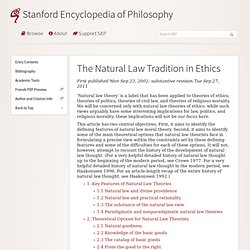
We will be concerned only with natural law theories of ethics: while such views arguably have some interesting implications for law, politics, and religious morality, these implications will not be our focus here. This article has two central objectives. First, it aims to identify the defining features of natural law moral theory. Second, it aims to identify some of the main theoretical options that natural law theorists face in formulating a precise view within the constraints set by these defining features and some of the difficulties for each of these options. 1. Even though we have already confined ‘natural law theory’ to its use as a term that marks off a certain class of ethical theories, we still have a confusing variety of meanings to contend with. 2. Relativism. First published Sun Feb 2, 2003 Relativism is not a single doctrine but a family of views whose common theme is that some central aspect of experience, thought, evaluation, or even reality is somehow relative to something else.
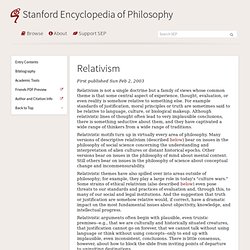
For example standards of justification, moral principles or truth are sometimes said to be relative to language, culture, or biological makeup. Although relativistic lines of thought often lead to very implausible conclusions, there is something seductive about them, and they have captivated a wide range of thinkers from a wide range of traditions. Relativistic motifs turn up in virtually every area of philosophy.
Many versions of descriptive relativism (described below) bear on issues in the philosophy of social science concerning the understanding and interpretation of alien cultures or distant historical epochs. Relativistic themes have also spilled over into areas outside of philosophy; for example, they play a large role in today's "culture wars. " 1. Moral Epistemology. First published Tue Feb 4, 2003; substantive revision Mon Nov 7, 2011 How is moral knowledge possible?
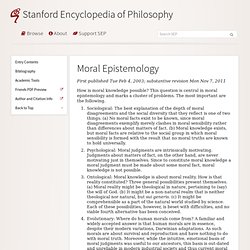
This question is central in moral epistemology and marks a cluster of problems. The most important are the following. Sociological: The best explanation of the depth of moral disagreements and the social diversity that they reflect is one of two things. Moral Relativism. First published Thu Feb 19, 2004; substantive revision Tue Dec 9, 2008 Moral relativism has the unusual distinction—both within philosophy and outside it—of being attributed to others, almost always as a criticism, far more often than it is explicitly professed by anyone.
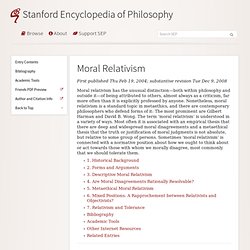
Nonetheless, moral relativism is a standard topic in metaethics, and there are contemporary philosophers who defend forms of it: The most prominent are Gilbert Harman and David B. Wong. Moral Naturalism. First published Thu Jun 1, 2006; substantive revision Mon Aug 7, 2006 While “moral naturalism” is sometimes used to refer to any approach to metaethics intended to cohere with naturalism in metaphysics more generally, the label is more usually reserved for naturalistic forms of moral realism according to which there are objective moral facts and properties and these moral facts and properties are natural facts and properties.
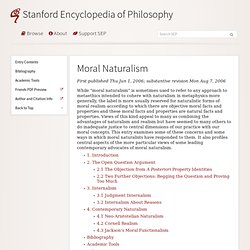
Moral Realism. First published Mon Oct 3, 2005; substantive revision Thu Dec 10, 2009 Taken at face value, the claim that Nigel has a moral obligation to keep his promise, like the claim that Nyx is a black cat, purports to report a fact and is true if things are as the claim purports.
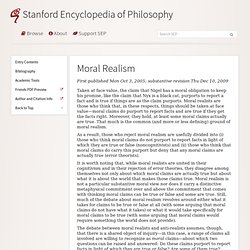
Moral realists are those who think that, in these respects, things should be taken at face value—moral claims do purport to report facts and are true if they get the facts right. Virtue Ethics. 1.
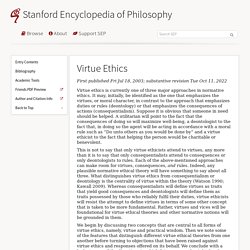
Preliminaries Virtue ethics' founding fathers are Plato and, more particularly Aristotle (its roots in Chinese philosophy are even more ancient) and it persisted as the dominant approach in Western moral philosophy until at least the Enlightenment. It suffered a momentary eclipse during the nineteenth century but re-emerged in the late 1950's in Anglo-American philosophy. It was heralded by Anscombe's famous article “Modern Moral Philosophy” (Anscombe 1958) which crystallized an increasing dissatisfaction with the forms of deontology and utilitarianism then prevailing. Its re-emergence had an invigorating effect on the other two approaches, many of whose proponents then began to address these topics in the terms of their favoured theory.
But although modern virtue ethics does not have to take the form known as “neo-Aristotelian”, almost any modern version still shows that its roots are in ancient Greek philosophy by the employment of three concepts derived from it. 2. 3. (a) (b) 4. Practical Reason. First published Mon Oct 13, 2003; substantive revision Wed Mar 26, 2014 Practical reason is the general human capacity for resolving, through reflection, the question of what one is to do.
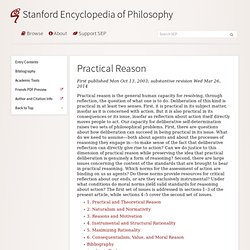
Deliberation of this kind is practical in at least two senses. First, it is practical in its subject matter, insofar as it is concerned with action. But it is also practical in its consequences or its issue, insofar as reflection about action itself directly moves people to act. Our capacity for deliberative self-determination raises two sets of philosophical problems. 1. Practical reason defines a distinctive standpoint of reflection. A natural way to interpret this point of view is to contrast it with the standpoint of theoretical reason. Practical reason, by contrast, takes a distinctively normative question as its starting point. Theoretical reason, interpreted along these lines, addresses the considerations that recommend accepting particular claims as to what is or is not the case. 2. 3. 4.